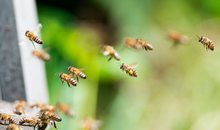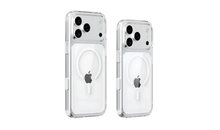
 Flash News
Flash News
International drug search: 36-year-old arrested in Durrës (NAME)
Veliaj's appeal to be heard today in the High Court
Today's hearing at the Fier Court, Salianji requests conditional release
Taxi collides with truck on Lezhë-Shkodër axis, driver taken to Trauma in serious condition
At least 91 dead in Texas floods

In laboratories across the United States, scientists are studying animals and insects for their cancer-detecting properties. As Voice of America correspondent Dora McCourt reports, recent research suggests that bees and dogs can detect the disease faster than medical devices.
Earlier this year, researchers at the University of Michigan discovered that bees with their keen sense of smell can detect lung cancer in a patient's breath.
"Our world is visual. The insect world is all about smell, so their sense of smell is very good," Debajit Saha, assistant professor of biomedical engineering at the University of Michigan, told VOA.
His team discovered that bees can smell lung cancer on a patient's breath.
"Our research shows that bees can detect lung cancer and possibly other diseases based on the smell the cells carry," he says.
Some bees were exposed to tests that mimicked the breath of a lung cancer patient. In 93% of cases the bees could distinguish between the breath of a cancer patient and healthy artificial respiration. Bees could also distinguish between different types of lung cancer.
"We think that diagnosing cancer through breathing can change everything. The reason is that many times we discover the cancer late, when the tumor has already grown", says Mr. Saha.
Researchers are also studying the dog's properties in early cancer detection. Animals have been trained to recognize specific odors of cancer.
"Many other animals also have highly developed senses of smell. But what makes dogs so good is that they cooperate with people and that's how they convey information," says Dr. Cindy Otto, from the University of Pennsylvania.
"Dogs love to interact. So it's like a fun game for them. They use their brains, they use their noses to find out," says Clara Wilson, of the Penn Vet Working Dog Center.
Dogs may think they're playing, but researchers say they can detect cancer better than medical equipment.
"We are finding that these dogs are bypassing the computers. "Part of their success is due to their superior ability to detect scent molecules compared to anything we currently use," says Amritha Mallikarjun, of the Penn Vet Working Dog Center.
Scientists are continuing to work with both dogs and bees to learn more about their ability to detect different types of cancer early.
Latest news


Thethi rooster and the dung cock
2025-07-08 10:24:01

Fire in Dukat endangers Llogara National Park
2025-07-08 10:01:39
International drug search: 36-year-old arrested in Durrës (NAME)
2025-07-08 09:50:48
Thethi, tourists "criticize" modern trend
2025-07-08 09:39:54
Fire on Mount Dukat still active, Llogara National Park at risk
2025-07-08 09:28:12
Veliaj's appeal to be heard today in the High Court
2025-07-08 09:16:02
"Bad sign for democracy"/ Parliament neglects reporting by institutions
2025-07-08 09:04:56
Today's hearing at the Fier Court, Salianji requests conditional release
2025-07-08 08:56:39


Horoscope, what do the stars have in store for you today?
2025-07-08 08:16:19
Weather forecast/ How temperatures will vary throughout the day
2025-07-08 08:02:37
Morning Post/ In 2 lines: What mattered yesterday in Albania
2025-07-08 07:48:30





Marrëdhënia që s’është romancë, por s’është as thjesht kolegiale
2025-07-07 21:39:13
Citizen is asked to pay 2.5 million for a non-existent meter
2025-07-07 21:28:03




What is the ideal air conditioner temperature in summer?
2025-07-07 20:53:46
GJKKO left him in prison, Meta appeals the decision
2025-07-07 20:38:05
Where is Ronaldo after missing Diogo Jota's funeral?
2025-07-07 20:38:04

Messages from the author who killed Ilaria Sulla in Rome are revealed
2025-07-07 20:20:12
At least 91 dead in Texas floods
2025-07-07 20:12:02
Elbasan, choked by smoke, scorched by conscience
2025-07-07 19:48:16

Swarm of bees attacks citizens in France, 24 people end up in hospital
2025-07-07 19:32:03
Dementia/Hearing loss may be a warning sign
2025-07-07 19:13:06
The decision for Malltez, Gjokutaj: Boomerang for SPAK and the Court
2025-07-07 19:01:08

Former Supreme Court member acquitted of asset concealment
2025-07-07 18:36:40

WIIW expert in Politiko: Brain drain is steadily weakening the Albanian economy
2025-07-07 18:11:41
Heart health is at risk from extreme heat, here's what you should be careful of
2025-07-07 18:10:18
Today Gert Bogdani would celebrate, Edlira Çepani's touching dedication
2025-07-07 17:40:45






The striker severely accuses the Fenerbahce club: They tried to drug me
2025-07-07 16:21:03
A decomposed body is found in Kolonjë, initial suspicions
2025-07-07 16:03:31
Accident in Saranda, car hits motorcycle, one injured
2025-07-07 15:58:56

The most fertile age for men and women
2025-07-07 15:40:52
Locals, Rama candidate in 5 municipalities
2025-07-07 15:32:22
Blushi: Meta's criminal kidnapping, incomparable even to Navalny's in Russia
2025-07-07 15:20:34
Meet the iPhone 17 Pro, the main innovations in design and technology
2025-07-07 15:09:09
Why the release of Abi Malltez does not free him; much less Albania
2025-07-07 15:00:12
‘Lidhjet klienteliste’ të mjekëve mbushin recetat e pacientëve
2025-07-07 14:57:33
Poland imposes border controls with Germany and Lithuania
2025-07-07 14:48:15

Caught transporting firearms from Kosovo to Albania, young man arrested (NAME)
2025-07-07 14:37:47
Theo Hernandez flies to Saudi Arabia for medical check-ups
2025-07-07 14:26:47


Scorching heat, Greece orders mandatory work holidays
2025-07-07 13:54:25




Trump expects Netanyahu to discuss Gaza ceasefire
2025-07-07 12:54:27

GJKKO releases Jamarbër Malltezi from house arrest
2025-07-07 12:35:02
Tourism among contrasts
2025-07-07 12:31:01
IKMT action in Theth, starts demolition of unauthorized constructions
2025-07-07 12:24:18

The Tirana-Kamëz line is destroyed by urban fire
2025-07-07 12:00:24




Poor direction!
2025-07-07 11:16:01


Rama to gather the country's mayors on July 9
2025-07-07 10:43:31

Ohrid Natural Park on the way to UNESCO's "black list"
2025-07-07 10:25:58

Registrations for the new school year begin in e-Albania
2025-07-07 09:59:09
KAS decides the "fate" of the elections in four districts of the country today
2025-07-07 09:50:51
Rama does not give up on Vlora, visits the municipality again
2025-07-07 09:39:11


Fires in Gjirokastra, flames very close to cultural monuments
2025-07-07 09:12:49

Foreign exchange, the rate at which foreign currencies are sold and bought
2025-07-07 08:39:57

Horoscope, what do the stars have in store for you today?
2025-07-07 08:14:17
The week starts with scorching temperatures, the thermometer reaches 37°C
2025-07-07 07:58:36
